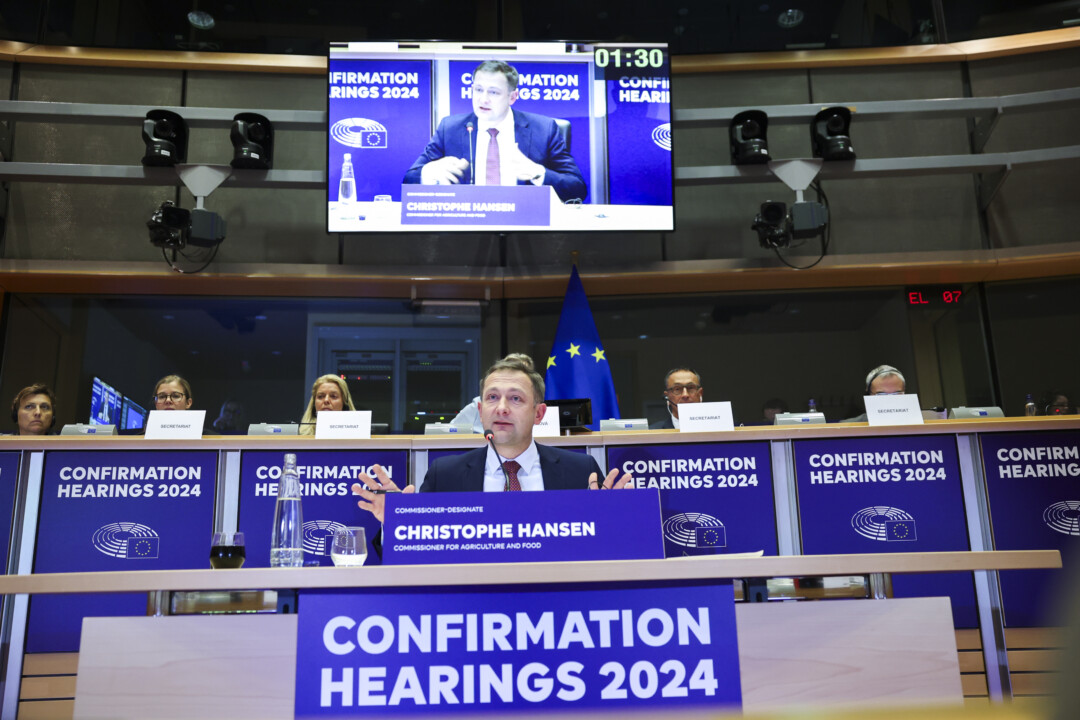 Image: European Union 2024 - Source : EP
Image: European Union 2024 - Source : EP
After an intense week of commissioner hearings, here is what has been served up for European food and farming! Luxemburg’s Christophe Hansen (from the EPP political group) promises to be a “boots-on-the-ground commissioner” for agriculture and food. The three-hour grilling covered a wide range of topics, reflecting the complexity of the agri-food system. Also reflecting the importance of this sector, agri-food topics were touched upon in the hearings of Jessika Roswall for Environment, Water Resilience and a Competitive Circular Economy (EPP), Olivér Várhelyi for Health and Animal Welfare (independent but affiliated with the EPP and PfE political groups) and Wopke Hoekstra for Climate, Net-Zero and Clean Growth (EPP). Here are some of the main take-aways for us:
- On the EU’s Common Agricultural Policy (CAP): Hansen stressed that the CAP will remain an important support to EU farmers and seemed open to discussions around a fairer distribution of CAP funds to smaller farms, as was suggested in the report from Strategic Dialogue on the Future of EU Agriculture. In particular, he emphasised several times that farmers deserve to receive a fair income. Additionally, Hansen spoke of finding a balance between reducing the administrative burden on farmers and the need to monitor the flow of public money.
- On agricultural greenhouse gas (GHG) emissions: Hansen sees an emissions trading system for agriculture critically, calling it “administratively tricky and hugely challenging”. And he carefully navigated the topic of reducing GHG emissions in the livestock sector, favouring technical solutions over a reduction of livestock numbers. When Hoekstra was asked about the reduction of agricultural GHG emissions during his hearing, he remained vague, saying the commission wants to work on making agriculture more sustainable, and focused more on “a strategic supply [of food] and a sustainable income for farmers”.
- On agriculture becoming more environmentally-friendly: in her hearing, Roswall said she plans to work with Hansen as well as with farmers to improve sustainability but did not get into specifics. Like Hansen, she highlighted the role of technological solutions, saying this was not only important for sustainable farming but also for food security and bringing new farmers into agriculture. She very briefly cited the Strategic Dialogue: “there are a lot of things in the report that we can use”.
- On meat consumption and alternative proteins: Hansen said diets should be healthy and well-balanced, which for him includes meat. He showed scepticism toward food policies that encourage a shift toward more planted-based foods, seeing it as “imposing who needs to eat what” onto consumers. In his hearing, Várhelyi was not critical of mass animal farming, stating that it “is the sector that gives food on our table”. And while Várhelyi trusted the safety of authorised alternative proteins, he said ethical misgivings around such foods should be taken seriously.
Our conclusion: important economic and social topics around farming were discussed, as they should be, but the environmental side came up short.
- For example, while technical innovation can contribute to climate change mitigation and adaptation, more ideas on how to reduce agricultural emissions would have been welcome, such as carbon farming, or being open to the possibility of reducing livestock numbers in a way that also supports livestock farmers.
- Also missing from the hearings was the topic of increasing biodiversity in agroecosystems, which in addition to tackling the biodiversity crisis can be beneficial for climate resilience.
- Discussions around a shift toward more plant-based diets as well as the development of a food policy for more sustainable diets can be done in a way that doesn’t need to mean imposing diet choices on citizens or a devaluation of livestock farming and its products.
Unlike the previous Commissioner for Agriculture, who reported to the executive vice-president for the Green Deal, Hansen will be reporting to Raffaele Fitto, executive vice-president for Cohesion and Reforms (from the ECR political group). This change indicates a shift away from climate action towards an economy-oriented approach, something that was reflected in the answers the Commissioner-Designates gave during their hearings. The farmers’ protests at the beginning of the year could well have contributed this shift, with farmers being discontented about the economic pressure they are under as well the burden they feel has been placed upon them by strict environmental measures. What was promising is that the Strategic Dialogue on the Future of EU Agriculture was seen positively by both Hansen and Roswall and continuing cross-sectoral collaborations as seen in the strategic dialogue are vital to find solutions to environmental, social and economic challenges and to ensure a future-oriented agrifood system.
At the time of the publication of this blog post, commissioner-designates Hansen, Roswall and Hoekstra have been approved by their relevant parliamentary committees, while the decision to approve (or reject) Várhelyi and Fitto has been postponed.
You can watch Hansen's full hearing here.
This Blog Post was written by Ingrid Bunker, EPICO's Policy Specialist for Sustainable Agriculture and Food Systems.
